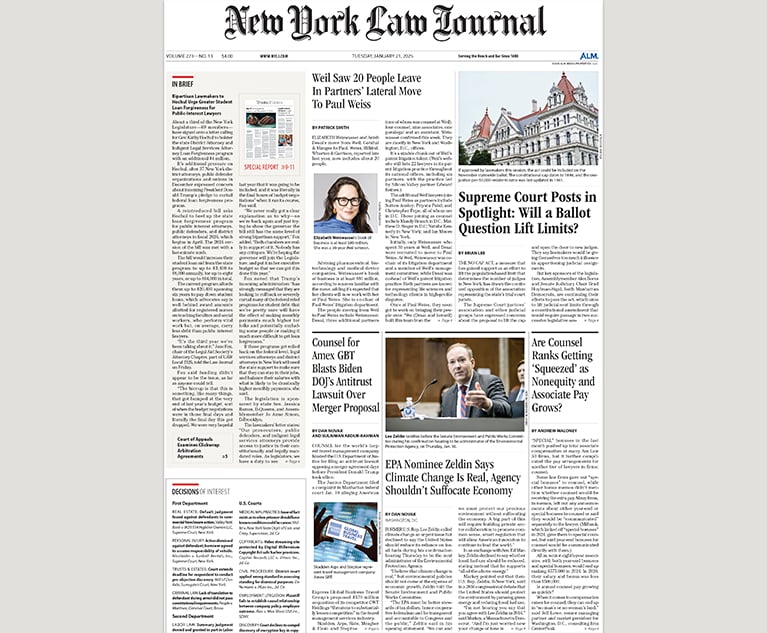City to Pay $600K in Race Bias Case Brought by Ex-Law Department Lawyer
The settlement resolves discrimination claims by Robert Gordon, now practicing at Wilson Elser. "It's affected my health, my mind, my sanity," Gordon said of the seven-year-old case.
December 03, 2019 at 02:04 PM
5 minute read
 Robert Gordon
Robert Gordon
An African American attorney now at Wilson Elser Moskowitz Edelman & Dicker who claimed he suffered racial discrimination in his previous job at the New York City Law Department has settled with the city for $600,000.
Robert Gordon had alleged that his Law Department supervisors gave him overly harsh and unsubstantiated evaluations in his 12 years working in the Tort Division, and retaliated against him for suggesting improvements and for making complaints under federal civil rights law. He resigned in 2016 and took an of-counsel role at Wilson Elser.
On Tuesday, which had previously been set for the first day of trial in his case, Bruce Rosenbaum, a lawyer for the city and Gordon's supervisors, and Sam Maduegbuna of Maduegbuna Cooper, who represented Gordon, outlined the basic terms of the $600,000 settlement as it was placed in the court record before U.S. District Judge J. Paul Oetken of the Southern District of New York. The deal includes legal fees and costs and a broad general release of any other claims Gordon might have against the city and its employees who were defendants.
"It's been seven years and I think the city put me through the ringer," Gordon said outside the courtroom. He briefly took the stand to confirm that he understood the settlement.
"It's affected my health, my mind, my sanity," he said, citing the risk that a trial verdict would be appealed and drag the process out even longer. "I just felt I needed to put an end to it."
According to a summary judgment decision entered in September 2018, Gordon began working for the Law Department's Manhattan trial unit in August 2004. He told a supervisor some 11 months after he started that he was "drowning in motions" and later suggested ways that the office's procedures could be improved. He contended that he received nearly the lowest possible score on his next performance evaluation, and was put on a sort of probation called an "action plan" in retaliation for his criticisms.
Gordon submitted an internal Equal Employment Opportunity complaint in January 2006 and moved from the Manhattan trial unit to the Tort Division's Queens office in April. He was relieved of close supervision, his performance reviews improved, and after putting himself up for consideration, he was transferred in August 2007 to the Tort Division's centralized Special Litigation Unit, which handles complex and high-exposure claims against the city.
As he was preparing to go on a year's leave to teach law in South Korea in mid-2011, Gordon said he was given a harsh and inaccurate performance review for the year. He disputed it and filed a complaint with the Equal Employment Opportunity Commission in early 2012. On his return, he was cut from the SLU and sent back to doing simpler tort cases in the Queens office. Before and after his return, Gordon said white Law Department attorneys were given promotions and placements that he was denied.
Gordon was promoted to senior counsel—too late, he said—and received strong performance evaluations in 2014 and 2015. He initially sued the city in 2014, while still working in the Bronx office. In 2016, he suffered a panic attack at work, punched a cabinet and sought leave; he subsequently amended his suit to include allegations under the Family and Medical Leave Act in 2016, saying that the city had interfered with his rights under the law and terminated his health coverage in retaliation for his complaints.
Certain claims were trimmed from the suit at the dismissal and summary-judgment stages, but several others—for disparate treatment under federal, state and city civil rights laws, and for interference with his FMLA rights—were headed for trial before a notice of settlement was filed late last week.
Maduegbuna said outside the courtroom that he believed the suit had led to changes within the SLU, which had historically had few black attorneys and virtually no black supervisors. Now, he said, the unit's chief is a member of a racial minority, and several African American attorneys have been promoted, he said.
"A settlement of this magnitude is significant," Maduegbuna added. "The Law Department doesn't pay this kind of money … unless they believe they have very significant exposure going forward."
The Law Department said settlement "was in the best interests of all parties" and said it had a strong track record on diversity.
"The Law Department has long been one of the most diverse law offices in the nation," said Nicholas Paolucci, a spokesman for the department. "We're committed to merit and fairness as the basis of all our personnel decisions."
Other lawyers appearing for the parties Tuesday included Dominique Saint-Fort for the city and William Cowles, of Maduegbuna's firm, for Gordon.
This content has been archived. It is available through our partners, LexisNexis® and Bloomberg Law.
To view this content, please continue to their sites.
Not a Lexis Subscriber?
Subscribe Now
Not a Bloomberg Law Subscriber?
Subscribe Now
NOT FOR REPRINT
© 2025 ALM Global, LLC, All Rights Reserved. Request academic re-use from www.copyright.com. All other uses, submit a request to [email protected]. For more information visit Asset & Logo Licensing.
You Might Like
View All
Neighboring States Have Either Passed or Proposed Climate Superfund Laws—Is Pennsylvania Next?
7 minute read
Law Firms Mentioned
Trending Stories
- 1NJ Supreme Court Clarifies Affidavit of Merit Requirement for Doctor With Dual Specialties
- 2Whether to Choose State or Federal Court in a Case Involving a Franchise?
- 3Am Law 200 Firms Announce Wave of D.C. Hires in White-Collar, Antitrust, Litigation Practices
- 4K&L Gates Files String of Suits Against Electronics Manufacturer's Competitors, Brightness Misrepresentations
- 5'Better of the Split': District Judge Weighs Circuit Divide in Considering Who Pays Decades-Old Medical Bill
Who Got The Work
J. Brugh Lower of Gibbons has entered an appearance for industrial equipment supplier Devco Corporation in a pending trademark infringement lawsuit. The suit, accusing the defendant of selling knock-off Graco products, was filed Dec. 18 in New Jersey District Court by Rivkin Radler on behalf of Graco Inc. and Graco Minnesota. The case, assigned to U.S. District Judge Zahid N. Quraishi, is 3:24-cv-11294, Graco Inc. et al v. Devco Corporation.
Who Got The Work
Rebecca Maller-Stein and Kent A. Yalowitz of Arnold & Porter Kaye Scholer have entered their appearances for Hanaco Venture Capital and its executives, Lior Prosor and David Frankel, in a pending securities lawsuit. The action, filed on Dec. 24 in New York Southern District Court by Zell, Aron & Co. on behalf of Goldeneye Advisors, accuses the defendants of negligently and fraudulently managing the plaintiff's $1 million investment. The case, assigned to U.S. District Judge Vernon S. Broderick, is 1:24-cv-09918, Goldeneye Advisors, LLC v. Hanaco Venture Capital, Ltd. et al.
Who Got The Work
Attorneys from A&O Shearman has stepped in as defense counsel for Toronto-Dominion Bank and other defendants in a pending securities class action. The suit, filed Dec. 11 in New York Southern District Court by Bleichmar Fonti & Auld, accuses the defendants of concealing the bank's 'pervasive' deficiencies in regards to its compliance with the Bank Secrecy Act and the quality of its anti-money laundering controls. The case, assigned to U.S. District Judge Arun Subramanian, is 1:24-cv-09445, Gonzalez v. The Toronto-Dominion Bank et al.
Who Got The Work
Crown Castle International, a Pennsylvania company providing shared communications infrastructure, has turned to Luke D. Wolf of Gordon Rees Scully Mansukhani to fend off a pending breach-of-contract lawsuit. The court action, filed Nov. 25 in Michigan Eastern District Court by Hooper Hathaway PC on behalf of The Town Residences LLC, accuses Crown Castle of failing to transfer approximately $30,000 in utility payments from T-Mobile in breach of a roof-top lease and assignment agreement. The case, assigned to U.S. District Judge Susan K. Declercq, is 2:24-cv-13131, The Town Residences LLC v. T-Mobile US, Inc. et al.
Who Got The Work
Wilfred P. Coronato and Daniel M. Schwartz of McCarter & English have stepped in as defense counsel to Electrolux Home Products Inc. in a pending product liability lawsuit. The court action, filed Nov. 26 in New York Eastern District Court by Poulos Lopiccolo PC and Nagel Rice LLP on behalf of David Stern, alleges that the defendant's refrigerators’ drawers and shelving repeatedly break and fall apart within months after purchase. The case, assigned to U.S. District Judge Joan M. Azrack, is 2:24-cv-08204, Stern v. Electrolux Home Products, Inc.
Featured Firms
Law Offices of Gary Martin Hays & Associates, P.C.
(470) 294-1674
Law Offices of Mark E. Salomone
(857) 444-6468
Smith & Hassler
(713) 739-1250








